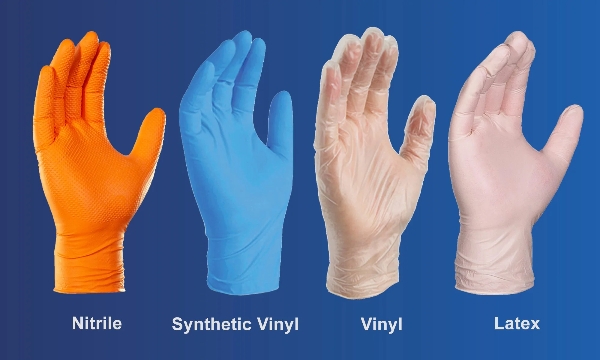Precautions for Use:
1. Make sure the size of the gloves fits your hand before wearing. If the gloves are too tight, they are easy to break; if they are too loose, it may cause inconvenience in operation.
2. After wearing, it is strictly forbidden to contact with substances that corrode rubber, such as acids and alkalis, so as not to damage the material of the gloves and cause protection failure.
3. Some people may be allergic to the protein in latex, so you should confirm whether you are allergic to such materials before use. If allergic symptoms occur, stop using it immediately.
4. When storing for a long time, pay attention to avoid direct sunlight, humid environment, high temperature and ozone to maintain the quality of the gloves.
How to choose the right disposable gloves?
1. Disposable Latex Gloves
Applicable scenarios:
· Healthcare: Due to their good touch and flexibility, latex gloves are often used in operating rooms, emergency departments, and other medical environments that require high-precision operations.
· Laboratory work: Latex gloves can provide necessary protection and facilitate delicate operations when strong chemicals are not involved.
· Food processing and service: Suitable for short-term contact with food, but be careful to choose powder-free or hypoallergenic products to avoid food contamination.
Restrictions:
· Latex gloves are not suitable for those who are allergic to latex proteins.
· Not recommended for handling grease or certain strong acid and alkali solutions.
2. Disposable Nitrile Gloves
Applicable scenarios:
· Chemical laboratories: Due to their excellent chemical resistance, nitrile gloves are ideal for handling a variety of acids, alkalis, and other corrosive chemicals.
· Industrial environments: Nitrile gloves can effectively protect hands from oils and solvents in workplaces such as car repair, printing, and painting.
· Medical fields: Nitrile gloves are the first choice, especially in places where there is a risk of latex allergies, such as dental clinics or specific departments in hospitals.
· Food processing: Nitrile gloves that meet FDA standards can be used for food handling to ensure food safety.
Limitations:
· Although nitrile gloves are more durable than latex gloves, they may not be as stable as other materials in extreme temperatures.
3. Disposable PVC Gloves/Disposable Vinyl Gloves
Applicable scenarios:
· Cleaning work: For daily cleaning tasks, PVC gloves provide basic hand protection while being inexpensive.
· Electronics industry: In work environments that require anti-static, PVC gloves are a good choice.
· Food service: When low-cost disposable gloves are needed, PVC gloves can be used as a temporary solution, especially when they do not need to be worn for a long time.
Limitations:
· PVC gloves have low elasticity and comfort, and long-term wear may cause discomfort.
· They have weak chemical resistance and are not suitable for direct contact with strong acids, strong bases or other harmful chemicals.
Post time: Feb-18-2025


